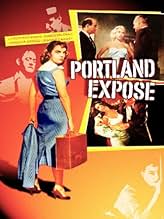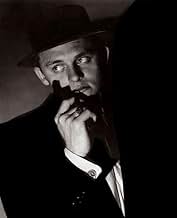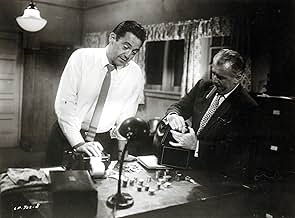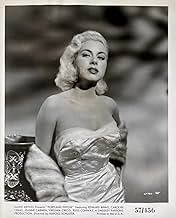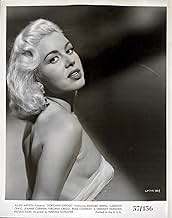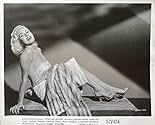Ajouter une intrigue dans votre langueA tavern owner in mid-century Portland, Oregon finds the safety of himself and his family threatened when he becomes involved in a war between labor unions and a violent local crime syndicat... Tout lireA tavern owner in mid-century Portland, Oregon finds the safety of himself and his family threatened when he becomes involved in a war between labor unions and a violent local crime syndicate.A tavern owner in mid-century Portland, Oregon finds the safety of himself and his family threatened when he becomes involved in a war between labor unions and a violent local crime syndicate.
- Réalisation
- Scénario
- Casting principal
Lawrence Dobkin
- Garnell
- (as Larry Dobkin)
Joseph Marr
- Larry
- (as Joe Marr)
Richard Bellis
- Jimmy Madison
- (as Dickie Bellis)
John Alban
- Tavern Patron
- (non crédité)
Albert Cavens
- Tavern Patron
- (non crédité)
Beulah Christian
- Tavern Patron
- (non crédité)
Francis De Sales
- Alfred Grey
- (non crédité)
Kort Falkenberg
- Speed Bromley
- (non crédité)
Stanley Farrar
- Spud Lennox
- (non crédité)
Avis à la une
This is a tough look at the difference between unions and criminally controlled protection. Portland is a peculiar setting for a film noir. It works well, though: The opening narrative begins like a travelogue and gradually shifts into comments on the city's corruption.
The cast is excellent. It's not always the most beautiful looking group. The ingénue, who is pretty, wears her hair slicked back with what looks like Brylcreme. Virginia Gregg, the notable radio actress playing her mother, looks a little old for the role and tired.
It's a twisted movie, though. Catch this: Frank Gorshin, of all people, plays a hit man who is also a pedophile! That's a new one on me -- though child molestation does figure in that great classic of weirdness, film noir, and beauty "The Naked Kiss" a few years later.
The bit players add a lot. There's a scene, just a throwaway, in which a blonde playing a slot machine yells "Jackpot!" and goes into paroxysms of glee as the camera moves away and dumps her.
And the portly older gal imported to Portland to oversee the b-girl business is fabulous. We meet her as she gets off a plane and totters along in her high heels, fur stole wrapped defiantly around her. Her description of her "girls" is priceless: It prefigures the introduction Melanie Griffith provides herself in "Body Double" decades later.
Make no mistake: This is a serious movie. It was obviously done on the cheap. But it's done with great style.
The cast is excellent. It's not always the most beautiful looking group. The ingénue, who is pretty, wears her hair slicked back with what looks like Brylcreme. Virginia Gregg, the notable radio actress playing her mother, looks a little old for the role and tired.
It's a twisted movie, though. Catch this: Frank Gorshin, of all people, plays a hit man who is also a pedophile! That's a new one on me -- though child molestation does figure in that great classic of weirdness, film noir, and beauty "The Naked Kiss" a few years later.
The bit players add a lot. There's a scene, just a throwaway, in which a blonde playing a slot machine yells "Jackpot!" and goes into paroxysms of glee as the camera moves away and dumps her.
And the portly older gal imported to Portland to oversee the b-girl business is fabulous. We meet her as she gets off a plane and totters along in her high heels, fur stole wrapped defiantly around her. Her description of her "girls" is priceless: It prefigures the introduction Melanie Griffith provides herself in "Body Double" decades later.
Make no mistake: This is a serious movie. It was obviously done on the cheap. But it's done with great style.
Bit late for a vintage noir, by definition, and whilst not deeply caste in dark shadows throughout, makes up for this a little on the sleaze front. Competently made and presented as 'based on a true story' this is quite interesting for its detail on organised crime and its involvement at very modest levels with the help of 'rotten apple' police and corrupt union official plus assistance 'all the way to the top'. There are in fact some surprisingly sleazy moments, including a well shot and fairly vigorous attempted rape. There is also a super body disposal scene involving a train at night with the flashing lights of the carriages lighting up the killer's obvious delight. The central character is, however, just a little too much of a 'goodie two shoes' for my liking and the film does slow to a crawl at times when we have to consider the family implications. Worth a watch.
A tavern owner helps authorities get the goods on gangs trying to take over a labor union.
This Lindsley Parsons production is one of the many "confidential" or "expose" films of the time. Usually the tabloid title would include the name of a city whose supposed racketeers the movie would then expose. This movie appears inspired by the acid blinding of New York City labor reporter Victor Riesel in 1956 for his investigations into labor racketeering in that city.
The low-budget Parsons outfit may have produced this programmer, but they managed two key assets, despite the lowly origins. First, they got heavyweight actor Ed Binns for the lead, along with familiar face Virginia Gregg and that fine little actress Carolyn Craig. What Binns lacks in marquee value, he makes up for in sheer talent, having been one of the Twelve Angry Men (1957) in that powerhouse film of the same year.
Second, the movie did extensive location filming in Portland, lending the visuals both interest and a realistic air. The woodsy tavern, in particular, looks genuine instead of the usual Hollywood fakery. Then too, the screenplay manages some suspense, especially when Madison (Binns) goes undercover. But the highlight may be hoodlum Joe's (Gorshin) attempted rape of sweet little Ruth (Craig). It's pretty explicit for the time.
If there's a downside, in my book, it's the absence of real menace from any of the bad guys (contrast with the subtle menace of kingpin Edward Andrews' in Phenix City Story {1955}). All in all, however, the movie manages a number of interesting features without being anything special.
(In passing—Catch sexpot Jeanne Carmen (Iris) who was Marilyn Monroe's "bosom buddy" in more obvious ways than one. Also, such a shame that Carolyn Craig died so young and under rather mysterious circumstances, as well.)
This Lindsley Parsons production is one of the many "confidential" or "expose" films of the time. Usually the tabloid title would include the name of a city whose supposed racketeers the movie would then expose. This movie appears inspired by the acid blinding of New York City labor reporter Victor Riesel in 1956 for his investigations into labor racketeering in that city.
The low-budget Parsons outfit may have produced this programmer, but they managed two key assets, despite the lowly origins. First, they got heavyweight actor Ed Binns for the lead, along with familiar face Virginia Gregg and that fine little actress Carolyn Craig. What Binns lacks in marquee value, he makes up for in sheer talent, having been one of the Twelve Angry Men (1957) in that powerhouse film of the same year.
Second, the movie did extensive location filming in Portland, lending the visuals both interest and a realistic air. The woodsy tavern, in particular, looks genuine instead of the usual Hollywood fakery. Then too, the screenplay manages some suspense, especially when Madison (Binns) goes undercover. But the highlight may be hoodlum Joe's (Gorshin) attempted rape of sweet little Ruth (Craig). It's pretty explicit for the time.
If there's a downside, in my book, it's the absence of real menace from any of the bad guys (contrast with the subtle menace of kingpin Edward Andrews' in Phenix City Story {1955}). All in all, however, the movie manages a number of interesting features without being anything special.
(In passing—Catch sexpot Jeanne Carmen (Iris) who was Marilyn Monroe's "bosom buddy" in more obvious ways than one. Also, such a shame that Carolyn Craig died so young and under rather mysterious circumstances, as well.)
"Portland Exposé" follows a tavern owner in Portland, Oregon in the mid-20th-century who finds himself a linchpin to a crime syndicate's gambling racket after installing their pinball machines in his business. His attempts to overthrow them endanger the life of himself and his family.
This low-budget film noir is one of the more slick, gritty, and iron-fisted out there, but it's unfortunately been largely forgotten. It's a B-movie through and through, and while it does suffer some pacing issues and a lack of development, it is at times surprisingly shocking. It depicts rape attempts (including a preemptory one from a teenage girl's boyfriend), and other types of violence that are a bit shocking given the time it was made. It also depicts prostitution in a manner that is frank, reminiscent of how the subject is treated in pre-Code films like "The Story of Temple Drake."
Based on a series of crimes committed by real-life kingpin Jim Elkins, the screenplay never really fleshes out the inner workings of the syndicate or how exactly all of this ties together in the context of the labor unions, and that is probably its biggest trouble. At a quick-paced 72 minutes, there is not sufficient time to elucidate all of this. Where the film makes up for it is in its photography and acting, particularly that of Edward Binns as the tavern proprietor, Virginia Gregg as his concerned wife, and genre favorite Carolyn Craig (probably best known for her role in the original "House on Haunted Hill") as their tormented teenage daughter. All of the acting is surprisingly believable, and the scenarios pack a further punch because of it. The film possesses a borderline-documentary style that recalls 1955's "Kiss Me Deadly," though this film is far less surreal.
All in all, "Portland Exposé" is a solid film noir/thriller that largely succeeds on the basis of its performances and overall tone. It's a dark and gritty film noir, and has a certain kind of bitterness about it that makes it memorable even though it has narrative shortcomings. 7/10.
This low-budget film noir is one of the more slick, gritty, and iron-fisted out there, but it's unfortunately been largely forgotten. It's a B-movie through and through, and while it does suffer some pacing issues and a lack of development, it is at times surprisingly shocking. It depicts rape attempts (including a preemptory one from a teenage girl's boyfriend), and other types of violence that are a bit shocking given the time it was made. It also depicts prostitution in a manner that is frank, reminiscent of how the subject is treated in pre-Code films like "The Story of Temple Drake."
Based on a series of crimes committed by real-life kingpin Jim Elkins, the screenplay never really fleshes out the inner workings of the syndicate or how exactly all of this ties together in the context of the labor unions, and that is probably its biggest trouble. At a quick-paced 72 minutes, there is not sufficient time to elucidate all of this. Where the film makes up for it is in its photography and acting, particularly that of Edward Binns as the tavern proprietor, Virginia Gregg as his concerned wife, and genre favorite Carolyn Craig (probably best known for her role in the original "House on Haunted Hill") as their tormented teenage daughter. All of the acting is surprisingly believable, and the scenarios pack a further punch because of it. The film possesses a borderline-documentary style that recalls 1955's "Kiss Me Deadly," though this film is far less surreal.
All in all, "Portland Exposé" is a solid film noir/thriller that largely succeeds on the basis of its performances and overall tone. It's a dark and gritty film noir, and has a certain kind of bitterness about it that makes it memorable even though it has narrative shortcomings. 7/10.
Based on a "True Story" the opening scene features a panoramic view of Portland as the narration extols
the beauty, culture and incredible atmosphere of the city as a wonderful place to raise a family.
Sounds like Paradise but...it seems the town has been overran by murderous rival crime syndicates vying
for control of the lucrative pinball vending business.
Filmed in a semi-documentary style, Portland Expose reveals the sordid, corrupt side of the City of Roses. The movie follows the plight of local barkeeper George Madison (Edward Binns) as he becomes entangled with the criminal underworld after he agrees to have a pinball machine placed in his tavern. Soon the syndicate forces him to place even more machines and his formerly quiet pub becomes a hangout for the 'wrong crowd'. Regretting his decision Madison decides to fight back after his daughter (Carolyn Craig) is attacked in the parking lot by a syndicate thug (Frank Gorshin). With the cooperation of local officials Madison decides to go undercover to gather evidence to expose the rackets.
The movie draws inspiration from the detective exploitation magazines of the era that promised behind the scenes sordid details. The stories were usually presented in a lascivious manner to maximize sensationalism as they followed the crime investigation through the eyes of the investigators. Tame by today's standards, the film pushed the boundaries into the acceptable content of the time. Though it's a fairly typical 1950's matinee programmer, Portland Exposé weaves a pretty fair noirish tale. Gritty and not highly stylized, it features ensemble cast composed of prolific career character actors (Binns, Virginia Gregg, Russ Conway, Lawrence Dobkin, Frank Gorshin, Rusty Lane, Joe Flynn) who manage to make the movie better than might be expected. All in all a watchable B crime flick.
Filmed in a semi-documentary style, Portland Expose reveals the sordid, corrupt side of the City of Roses. The movie follows the plight of local barkeeper George Madison (Edward Binns) as he becomes entangled with the criminal underworld after he agrees to have a pinball machine placed in his tavern. Soon the syndicate forces him to place even more machines and his formerly quiet pub becomes a hangout for the 'wrong crowd'. Regretting his decision Madison decides to fight back after his daughter (Carolyn Craig) is attacked in the parking lot by a syndicate thug (Frank Gorshin). With the cooperation of local officials Madison decides to go undercover to gather evidence to expose the rackets.
The movie draws inspiration from the detective exploitation magazines of the era that promised behind the scenes sordid details. The stories were usually presented in a lascivious manner to maximize sensationalism as they followed the crime investigation through the eyes of the investigators. Tame by today's standards, the film pushed the boundaries into the acceptable content of the time. Though it's a fairly typical 1950's matinee programmer, Portland Exposé weaves a pretty fair noirish tale. Gritty and not highly stylized, it features ensemble cast composed of prolific career character actors (Binns, Virginia Gregg, Russ Conway, Lawrence Dobkin, Frank Gorshin, Rusty Lane, Joe Flynn) who manage to make the movie better than might be expected. All in all a watchable B crime flick.
Le saviez-vous
- AnecdotesFinal film of Lea Penman.
- ConnexionsFeatured in WatchMojo: Top 10 Movies Banned ONLY in America (2022)
Meilleurs choix
Connectez-vous pour évaluer et suivre la liste de favoris afin de recevoir des recommandations personnalisées
- How long is Portland Exposé?Alimenté par Alexa
Détails
- Date de sortie
- Pays d’origine
- Sites officiels
- Langue
- Aussi connu sous le nom de
- Portland Expose
- Lieux de tournage
- Société de production
- Voir plus de crédits d'entreprise sur IMDbPro
- Durée
- 1h 12min(72 min)
- Couleur
- Rapport de forme
- 1.85 : 1
Contribuer à cette page
Suggérer une modification ou ajouter du contenu manquant


